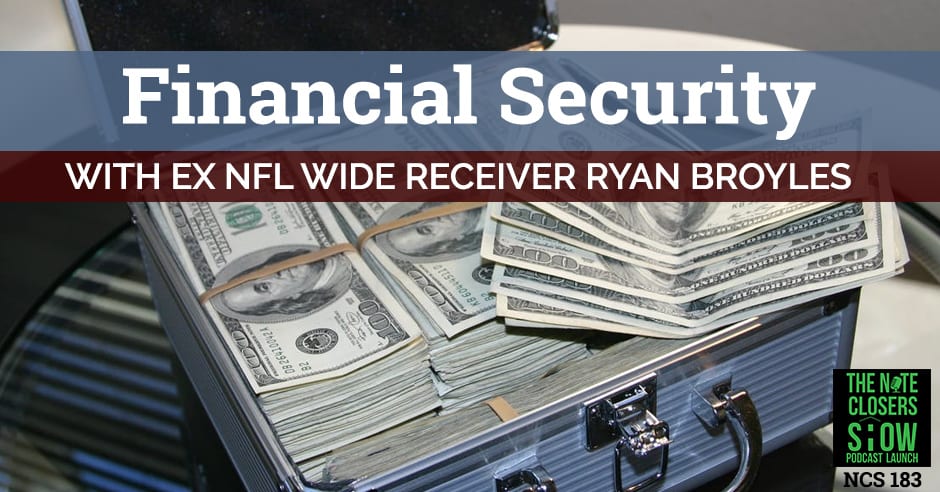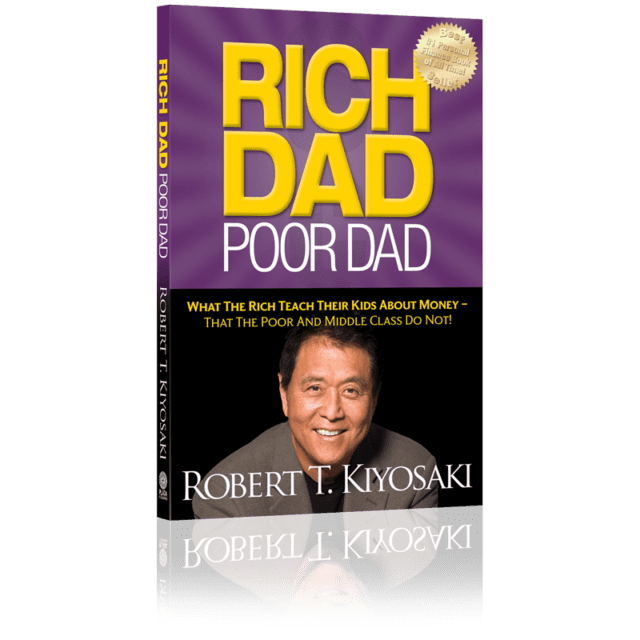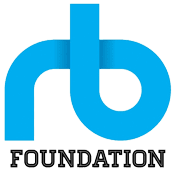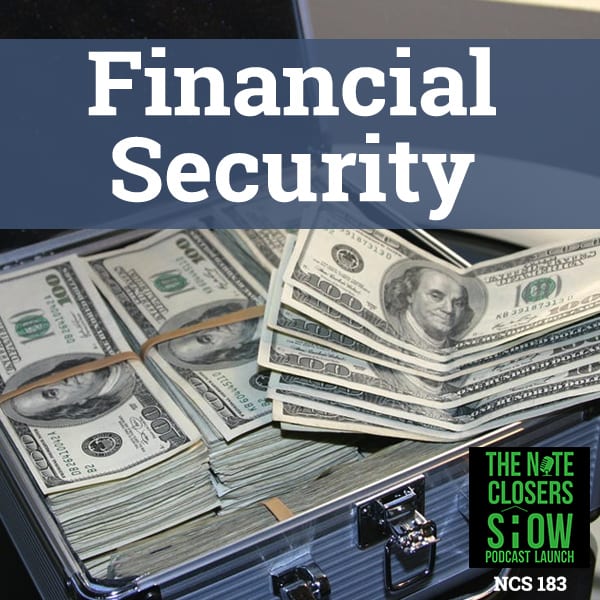
Scott interviews ex NFL Wide Receiver, Ryan Broyles, about his dedication to financial security by living on $60K per year while playing in the NFL and his passion for real estate.
—
Listen to the podcast here
Financial Security with Ex NFL Wide Receiver Ryan Broyles
We are excited and jacked up today to have a very special guest joining us. Our special guest is an amazing individual. I’m just going to recap how amazing the guy has been in the past but also what he’s doing now in the future. Our special guest was once a record holder for the most amount of catches in the college football subdivision. He was a two-time All-American at the University of Oklahoma, a second round draft pick of the Detroit Lions, and has also played three years in the NFL. We are honored today to have Ryan Broyles on the show today. Thanks for joining us.
I appreciate you having me.
Not a problem. We love having people on. I reached out to you was for two reasons. One, you’re not playing the NFL anymore but you’re a very active real estate investor, that’s the niche you chose to go into. I want you to share some of what you’re doing now. I think what really brought a lot of things a lot besides you playing the NFL was your notoriety for you and your wife, Mary Beth, who’s awesome from just what I’ve seen online. Behind every good man is even better, a more amazing woman. Your ability to shed and stiff-arm the high life of the NFL and stick to a budget to really set yourself up in a great place after you finish your NFL career, right?
Exactly. That’s always been the goal. I’ve had great mentors. My wife as well, she’s actually the one who jump-started these things well before I made it to the NFL. I just learned as much as I could and try to set my family up as well as myself when the game was over.
I think you credit a lot of it to changing your mentality when you’re new at the game, new in college. You were a big fan of Rich Dad Poor Dad. Is that correct?

Financial Security: Whenever I get discouraged, I go back to the basics of that book.
I really was. That was the first book that I picked up right before my rookie year in NFL. Let me just rewind where I even found that book. I got drafted and you hear all these crazy stories about people going broke. There was a rookie symposium that they hold in Canton, Ohio every year just for the rookies of the team of the NFL. One of the big stories is everyone goes broke. I went home and I just hopped on Google and people always going to get laughed at and I just Googled, “What do rich people do?” They invest among various things, real estate and stock market. I just dove in to find the books on those and in real estate, Rich Dad Poor Dad popped up. That was the first book I picked up. I got the notes in my little book that I always take my notes in. Whenever I get discouraged or whenever I need a boost, I go back to the basics of that book.
It was one of my favorite books that I read when I turned 24, sixteen years ago. I started to read it when it first came out. It definitely is mind-changing. You had an ACL tear and you had it like, “I’ve got to do something just in case it will end tomorrow,” right?
Yeah.
Do you credit a lot of that to the work ethic that your parents instilled at you at an early stage when you were mowing lawns and doing all that other stuff as a young kid?
Yeah, my parents are both hard workers. They showed us what it took to be successful, what it took to overcome things, and really what it took to just have hard work. I started mowing lawns when I was eight years old. I did that to fund AAU basketball trips. I did that for extra doughnuts at the lunch line. I always knew the value of dollar from my parents. Working was always a part of that.
My parents have hard work ethic but they didn’t really know a lot financially. A lot of financial education isn’t taught. I was reading a story about you. You’re like a lot of kids, didn’t care about your bills, you pay them when you got around to paying them. Was that a really difficult transition once you got to it or you just made it priority number one for you? Did you have Mary Beth like, “You aren’t going to go late on bills. You’ve got to pay now”?
That was definitely a pushback. When I was a senior in college, me and my wife now, she’s my girlfriend at the time, we moved in together and we were paying bills together. She was like, “Hold on, Ryan. You’re doing this wrong.” My life was turned off as a kid. I knew I didn’t want those things and my wife kicked me in my butt at times, “You’ve got to pay your bill on time. You’ve got to pay your electric bill on time.” I was the kind of guy that was, “I’ll pay it last minute. It’s no big deal.” When I got into the NFL, they pulled my credit report, and I had cellphone bills that weren’t paid, I had all these different things. I’m like, “This is really important,” but like a lot of people, we weren’t taught those things growing up. We didn’t know how important they were until it actually hits you in your mouth. It was a collective situation that jump-started me. Once I learned what it takes to be successful financially, I just went all in.
I love that how you basically set down the budget to cover your bills to pay. You have 28% towards your mortgage. You’re paying everything, you didn’t eat out a lot, you didn’t party a lot. I think a lot of that comes from having a great person there with you and Mary Beth being stable.
People were asking that question all the time. They were like, “Would you still live this lifestyle if you were single?” I’m like, “If you’re single, you have to be out and about with people.” I found my wife when I was sixteen years old so we’ve developed a relationship. Honestly, it’s good to have a good time, just don’t get me wrong. We still do but it’s not out there trying to show what we have so we can court a girl or what it might be.
Have you had some of your buddies at either college or NFL or anything like that come to you for advice seeing where you’ve been?
Yeah. Believe it or not, I feel every off-season since I’ve been done, someone contacts me here and there. They call me about real estate deals. They call me about financial advisors, insurance deals, just to shoot the breeze, catch up and then try to figure out their next step when they get done playing.
Do you feel you’ve gotten bombarded? Do you get bombarded with a lot of people coming to you, “I got a deal or I got something else”? I’ve got some buddies that play the NFL, my buddy Dat Nguyen was a linebacker for the Cowboys for years, experienced that quite a bit. Do you ran into that as well?
Yeah, especially when I was playing. There was somebody that had a big deal, a new startup, and I was just playing the game, just sticking to what I knew. Now at this point, I love new deals. They bring them all to me now and I’ll dissect those and take the ones that are good and the ones that aren’t. When I was playing my playing days, I didn’t have much foundation of investments. People will just ask me all kinds of things.
You’ve made the switch into real estate. What are the types of real estate deals that you like doing right now?

Financial Security: Over the last year, we started to go on distressed homes. That’s been my bread and butter up to this point.
I started out single-family homes. I kick myself in the butt now four, five years later that I bought most of my homes at market value. I started doing onesie-twosies here and there. I was like, “I can get a deal ten houses done the same way I can get one done.” I went to portfolio loans and for the most part, I got a good deal there just because I bought them in bulk. Over the last year, we started to go on distressed homes. That’s been my bread and butter up to this point.
Primarily in the Dallas market or Norman?
I’m in Oklahoma right now in Norman. We just finished three homes here this year and we just finished one out in Texas, so just searching the market looking for our next home.
You’re fix and flipping these up, turning them to rentals,. You’re just buying and keeping some?
Initially, when I started this flips 2017, I was like, “I’m going to sell these things off.” Then I just started seeing my profit on those deals, my spread was so much better, got my money back when I refinance them. I was like, “I can continue to buy these things well, fix them up better than the rentals around the area, and still put my money out of it.” At that point, I was like, “I’m not selling any of them.” If I do go with thinking I’m going to sell them just depending on how it works out numbers-wise, if I hit my budget, if I’m over and I need to liquidate, then obviously that’s there as well.
Is there a price point that are like your bread and butter, $100,000 or less or $200,000 or less or $1,000 to $200,000? What’s your price?
Usually$200,000 or less. I think mine is more on the rental market that I look at around $1,200 to $1,600 is probably the point that I like. It’s single-family homes and then one talks about location and schools and things like that, but I usually try to stay around those numbers.
Jason Bible is a buddy of ours out of Houston, Texas. He’s at about 400 homes over the last three years. He asks how hard is it to pull away time from the schedule of the busy season to invest?
Initially, I did not do any during the season. I always did the work on the off-season, that’s when I was studying, go to classes. Most of my work was done then. Towards the last year of my contract, at that point, I had teams built where I could go out and invest, just give them the keys, tell them what I’m looking for, and then they’ll shoot them over. After a meeting or some, I’ll check it and see what it looks like.
Let’s stress that because that’s important. I think a lot of real estate investors they go to a seminar or two-hour intro session and they get all excited. They watch Flip This House or Fix and Flop or AMC TV. We all know that’s not real life for the most part.
It really isn’t. It feels good to watch it. You see the turnover happen in the house so quick. Once you get down to those deals where it could take a little two to a month longer than what you expected, you’re looking at your budget every day, they don’t show them on those shows. They don’t show the contractors not showing up or things like that. At the end of the day, I think they do a good job of inspiring people. That’s essentially why I got into the game. There’s times when I tell my wife I was like, “I’m not going to do another one,” and then I end up doing another one.
I think that’s the story of everybody. But once you scratch that itch, you got it back and scratch that itch.. You went back to school after in the off-season. Did you finish up with your degree?
I don’t mean school as in formal school. I had some seminars, some business meeting classes. Not where you’re going to do homework, just go somewhere and get some education. For the most part, there are websites that I go to. YouTube, books, and you start to connect with people, like the guy with 400 properties. Those are the people that you want to talk to. It might not be at anyone’s game plan to have 400, but if he has 400 homes’ worth of experience, that’s somebody you want to talk to.
He started off with one deal at one point and grew it. Jason’s got a big team and he’s somebody we’ve had on as guest here before, it’s one of our top ten episodes as well. Let’s talk about your team. You’ve got your fix and flips. You’ve also got a restaurant that you’re in the process of finishing up at the University of Oklahoma in Norman but the name of it is The Porch at the campus corner. Let’s talk about how you dove into that. Is it a friendly situation or is it just a situation you couldn’t turn down?

Financial Security: It just fell in my lap and it was perfect timing.
It’s funny how it happened. I’ve got some commercial brokers that I usually touch base with on my deals and he was like, “This is the deal. It’s probably something not in your wheelhouse but I think it’s worth looking at.” I hopped on my email and it’s a restaurant deal. I’ve heard all those crazy stuff in restaurants. Then I get the resume of the guy that’s offering the deal. I saw the location and then I got the opportunity of talking to other big time restaurant entrepreneurs. They put me at ease, sent the business plan over to them as well. Over the last six, seven months now, I’ve learned a lot. It just fell in my lap and it was perfect timing.
Are you still running by your budget the same amount or has it adjusted a little bit?
Yeah, it’s definitely adjusted. At the time when I was a rookie, I didn’t know how long I was going to play. My back was against the wall there as well. Now that we’re back home in Norman, Oklahoma, I’ve got a little boy that’s two years old. The budget definitely fluctuates but over the last four years, I’ve got a lot more cashflow and properties so that definitely helps out. With the excess money that I have, I’m able to go back and invest.
Do you do anything in self-directed IRAs or educational saving accounts right now?
Yeah, for sure. That’s been a staple from the very beginning. I invested in the stock market probably about six, eight months before I did anything in real estate. I have a financial advisor that taught me to do those deals. Me and my wife have an IRA, SEP IRAS, and our 401(k)s. We continue to fund those deals. That’s a long-term and obviously trying to build some assets when we go to the bank and our network continues to grow. We’re backed by actual tangible assets, that definitely helps us out.
You start out with Rich Dad Poor Dad. You’re a very avid educator, videos, YouTube, going to different self-education seminars, what’s the book that you’re reading or listening to right now?
Believe it or not, I told myself in 2017, less is more. I’m actually doing more personal development stuff. I’m reading a book right now, it’s called Ageless Memory. It’s just talking about our brains and how to memorize things. That’s where I am right now. I’ve got a good knack at understanding properties so when I see them, I don’t feel like I’m at base zero anymore. I wouldn’t say I really dived in on those deals like I’m a newbie. It’s more personal development right now.
I think it’s a really smart thing to have because I think the best asset we have is ourselves. With you guys doing the real estate, how do you and your wife balance a lot of that relationship? You’re both very gung-ho about the real estate side. She manages specific aspects of it that you don’t touch. You work through your strengths. How does that balanced out for you?
We definitely balance things off of each other. My wife, she has better instincts than I do. If we drive by a property and she’s like, “I don’t really feel that,” and I look at the numbers and I like it, I usually go with what she says at the end of the day. Where she’s really stepped up that’s been very vital is on our rehabs. She’s got the eye to know what needs to go here and the material to pick out. Over this past year, she’s definitely helped out there. I’m not a guy that wants to dissect five different looks. My wife’s the one that, “This is the look. Let’s go with it.” I’m like, “It’s all yours.” I just had to bring the contractors at that point.
Going back, you’ve got a young one right now. What are some of the things that you’re going to instill in him at that age that maybe you didn’t learn? Have you given any thoughts of that or discussed that?
On the finance side, my parents, they were never too open about bills and credit scores and things like that and how much they made. All we just saw is it worked. I think when Sebastian gets to his age, I’m going to say, “This is why daddy is sitting on his computer doing this. This is what we’re trying to build. This is what we’re trying to do.” Just really talking about it a little bit more than what I got growing up. In this day and age, it’s taboo to talk finances and especially to your kids, but I think that’s something that I’m going to be able to instill on my little guy from the very beginning.
You also have a passion for travelling. You travel the world and stuff like that.

Financial Security: When I saw my contract back in 2012, we were like, “We’re going to go see the world.”
That’s been the most beneficial thing that we’ve ever done. We definitely want to be cultured. Growing up here in Oklahoma where it’s a tight knit place and not a lot of people live here, especially in Norman. When we got the opportunity to leave, we definitely do that. When I saw my contract back in 2012, we were like, “We’re going to go see the world.” A month after I got drafted, we went to China. We went to Hong Kong More frequently now that I’m not playing, we definitely try to go see places to be cultured. It’s funny you said that because we’re about to learn Spanish and we’re going to move over to Spain for about six months at the beginning of the year. It’s just about being in different places and stretching our minds because there’s a lot more to life than just living in your shelter.
The fact that you have a good team surrounding you allows you to be able to still live a life.
That’s the most beneficial, just financial freedom is always our goal. We just started a property management company. We’re in the point that we’re vetting out people to run those deals while we’re gone as well. We’re just trying to build these assets so we can go out and continue to live the life that we want to live and not only that, share it with people.
What’s your future plans? I know you have a passion for sharing that. Have you gone back and spoken with new guys in the NFL or at the OU as well trying to help give guidance to those guys?
I’m probably making a speech twice a month nowadays, whether it’s real estate or just personal development. Being in a position that I’ve been in, being able to come back home and speak to kids in low-income families. Even kids that have aspirations to make it into the league, kids that don’t get to go see the world. I rarely turn down an opportunity to speak. I’m fortunate to be in a position that I am and my wife are. It would be a huge sin for us not to go and give back. If you do things in the right manner, you’ll be able to help other people out. I feel that’s where we are in life right now.
It’s a great, great message to have and a great drive to help overcome things. I think a lot of the most successful people in the world are the most giving and the most approachable too, because they have big hearts and they’ve been down at the lowest point and pulled themselves out of there too. I think early on your budget that you’re playing and always putting at least 10% away of your budget towards your savings in your retirement. Are you still doing that or putting more into that now with the real estate being more successful?
I think at this point now, we want make sure we have a good enough cash reserves for the rental rehabs and things like that and the people that don’t pay their rent when they’re supposed to pay their rent. We’re to the point now where we’re just getting excess cash than we have. We like to travel and then we’re going to throw it back into some more investments and try to be as sound as we can there. We like to have a cash cushion where if all else fails and everything burns down, we can still make it.
That’s a great, great philosophy. So few people have that. Whether it’s learning it from Suze Orman or Dave Ramsey or Robert Kiyosaki of the Rich Dad Poor Dad, there are specific things that are easy to do, it’s just a matter of making a priority out there.
We hear a lot about lifestyle inflation. That’s something we try not to fall into. It’s hard when you get a deal done and you’re like, “This is going to bring in X amount of money.” My first thought, like it’s been from the very the very beginning is, “Let’s go buy another asset. We’re perfectly fine where we are.” I think that’s what a lot of people are amazed when we made it to NFL that, “This guy lives off $60,000 a year.” I was like, “I’m living the dream right now” to be honest and we’re going to try to keep that mentality. Being cultured, going other places. Seeing now here in America, we’ve got the most opportunity out of any country in this world. We don’t need much. We’ve been down to Haiti a few times and I tell you those are the happiest people in the world and they have nothing. I’m like, “There’s no way that I need to go out.” Not saying I don’t want to make a million in a year but I’m good at living at this range. I don’t need to go out here and buy all these depreciating liabilities and things like that. We’re pretty comfortable where we are.
We’ve got a buddy of ours, Scott Daley, who actually funds an orphanage in Haiti for about twenty plus kids out on his own pocket every year, out of his own real estate deals. He does tremendous job, takes people down there every year. I think it’s one thing you find is you like to give back. Besides Haiti, is there any other charities or things that you contribute to on a regular basis or passionate about?

Financial Security: It’s really centered towards people like me when I grew up.
I started a foundation in 2012. It’s not active now but it’s the Ryan Broyles Foundation. We help underprivileged families. I dressed up as Santa over the years, giving kids presents here and there. We do Thanksgiving giveaways. It’s really centered towards people like me when I grew up. We didn’t have much. We went to live at homeless shelters, lived in motels, and that’s where I want to inspire the most. Those are the people I feel that are neglected if you want to say. Those are places that we want to give back the most. We give back to the church. My wife’s a big advocate for animals so we give back to the animals. I’m on Facebook and I apply my Rich Dad Poor Dad. I’ve got all these various financial deals and the news. I look at my wife’s timeline and it’s animal this, animal that. It’s funny.
She’s the yin to your yang. Are there other people that you’ve networked with, ex-players or anybody who’s doing fix and flips, rehabs, and things like that and networked with them?
Not any ex-athletes, just really local business partners that I’ve had, just connecting with people around the United States that do that. I’m on BiggerPockets often so I get to associate with people on there but not anybody of an NFL stature, no. Granted if they come along, I’d be happy to do that and shoot the breeze with them, but not at this point.
I think I know that a couple of Cowboys, Emmitt Smith and Roger Staubach are big in the real estate community in Dallas.
Roger Staubach, he actually connected with me a couple of years ago and I know they have some big platform that they have going where they offer certain percentage. I’m too hands-on for that. I still have it on one of my folders here. I always look back to how they present those deals and I mimic some of the deals when I send it out to potential investors, I do the same thing.
You’ve come from a spot, didn’t have any money, you’ve got money, you’ve got your own money to do some things with which is great but you still have to do bigger things. You’re reaching out and raising capital from other investors and business owners, correct?
For sure. They said the name of the game is OPM, Other People’s Money. It makes perfect sense because there’s power in numbers and you only have so much to go around. In my game plan, we want to make sure that we have a significant amount of cash on the side. For our backs against the wall, we need other people. I might be the one that brings expertise as opposed to build together and some people might come to the table with their cash and vice versa. It’s always good to be able to find excess money so you can grow with those people. Hopefully as those things perform, you can roll those on others.
When you talk about presenting, are you talking to people one-on-one? Are you emailing it out to your database? What are some of the things that you’re doing for your deals?
When it first started, it was just people that I knew. Those are the people I feel is the hardest to break through on because they know who I was when I was a knucklehead at sixteen. They’re like, “He doesn’t know.” Usually, social media is really the biggest thing. I know there are laws against trying to solicit some people on there but there are ways around it I believe. That’s been one of the bigger ways that I’ve been able to connect with people that aren’t just in my backyard. There are people that just find my number, they find my email, my website and they connect and we go from there.
That always seems to be the biggest fear of somebody coming out of a regular job is asking for funds or asking for money. We’re a big believer that if the deal makes sense, if it’s good, you’ll find money for it.
I felt the same way because I didn’t want to be the guy with my hand out. People want to be successful. People want to get in the game. If you ask anybody what they want to invest in, it’s going to be one or two things: they want to fund their retirement whether it’s the stock market or they want to buy real estate. If you bring a game plan together and you just tell the story instead of the dollars, then I think that’s where it really starts to pay off.
Leveraging the fact that you’ve got a team behind you as well versus that you’re not going to be the guy doing everything too, right?

Financial Security: I’m definitely to the point where me and wife can go on vacation and things are still going to flow.
Yeah. When you start out, you might not have that team. I’m definitely to the point where me and wife can go on vacation and things are still going to flow. If something does happen to come up we’ve got that taken care of. I’m trying to find somebody now that can take over some of my emails where they can get the property before I have to look at it. I want to get to that point where I can do less is more. I was just reading a book called Retirement Extreme and it talks about a renaissance man. They said, “It’s better to do ten things at 10% than one thing at 100%.” Granted that’s taboo to what people to believe now but I think that’s where I am in my business. You want to delegate as much as you can, not to stretch yourself in. You want to work on your business and not in it. I’ve heard that a million times and it’s starting to make sense for me.
Besides reading Rich Dad Poor Dad, what’s another monumental moment in your life that changed your path?
I feel everything that I read now it all goes back to what Robert Kiyosaki was first preaching. I feel I read many books and read many articles and it touch base on the same things. That’s why I tell people all the time, “Once you read this book and you pick up anything else, you’re going to start to understand there are four, five points that people say when it comes to finance and especially real estate. You make money when you buy, don’t over-leverage yourself, have a firm foundation. These are the things to look forward if you’re doing distressed homes. These are the things to look forward when it comes to good raise to the bank, this is how to connect with this people.” I’m always to the point where I read so much. I just stick to the basics and I feel when things are good. I do want to take my game to the next level and be able to understand things outside of my region, really look at the economy and figure out, “This is where the jobs are growing. This is where the better tax falls. This is where rates are in.” I want to be able to maneuver with the big dogs at some point.
That’s great because I was going to ask you if you and Mary Beth have set one-year, five-year, ten-year goals or anything like that as well?
First, when I came out I was like, “I’m done playing this game. I want to have financial freedom.” Before I retired, we matched that goal. At the end of the day, I want to have a good strong marriage. I want my son to be well taken care of. I want to just keep a level head and help people out at the end of the day and then travel the world. That’s been our biggest goal. I try to talk to my friends about real estate or just investing in general because a lot of people are just scared, they’re nervous. I’m like, “I just want to sip piña coladas on the beach.” I guess those are my whys. I don’t want to get too big where I can’t go on vacation but I still want to grow and take advantage of the markets that are turning. I started investing in 2012 and we’ve been in that market since then. I’ve talked to some of my mentors where they talked about in the late 80s where rates were crazy and the world seem like it was falling apart then. I haven’t been there yet. There’s going to be some point where I’ve got to learn those deals. It’s not going to go up forever. I’m still an infant when it comes to investing in real estate. I’ve learned a lot up to this point and I’m going to continue to learn when things start to slide the other way.
We’ll make sure to send you some information on becoming a note investor when the market crashes like that, more and more opportunity which is good.
Without getting on the distressed side too is what I’ve heard. I’m excited for that. Granted I want people kick out of their houses but if you find the solution and you knew what the government sense the need you to do then you get rewarded for being in the right place in the right time.
I think it’s one of the most rewarding things that we do on the debt side is when we’re able to modify or reinstate a borrower. We bought 70 assets in the last 90 days and we’ve gotten 50 of them to re-perform, reinstate. The borrowers are happy to stay in the house and things like that. It’s a win-win and that’s what you ultimately want. Unless you’re playing football, then you want to be the only one on the winning side of the game.
We always want to win. If there’s a winner, there’s a loser for sure.
Were you surprised of Steve’s stepping down a few months ago?
I think everybody in America and all the fans are surprised. He always said he should have stepped down many years ago. I think it’s the best time for him. He came off with a big win. If he would have done it after the season, I don’t think people wouldn’t have been that surprised. He went to the dry season. He went through the spring. Then he steps down. That’s a bit of a surprise for sure. I got a little teary eyed when I heard about it. I sent him a message I said, “Hey, Coach. I love you.” He said he loves me too. That was definitely good to see.
Being a UT fan it was like, “What?” It was the first time in forever that both UT and OU have rookie head coaches. It’s going to make the Red River Rivalry very different here. If there’s one thing that you could leave as a quote or leave out there for people that are looking to dive in, what would that be?
Dive in to real estate. You’ve got to go. You don’t know what you don’t know. You’re not going to be a pro from the very beginning, so really just to keep it as simple as possible, dive in, learn. There’s going to be mistakes and just try not to repeat those deals and you just continue to stack those on top of each other and then you’ll learn to avoid the bad mistakes that you did make.
Do you have a deal that didn’t do well that you learn from?

Financial Security: My first flip that I ever did was a homerun success and that’s what catapulted me to go into to buy more properties.
Yeah. I guess my first flip that I ever did was in 2012 and that was a homerun success and that was really what catapulted me to go into to buy more properties. I bought a home then November of 2016, a distressed home. First, I went to the courthouse steps for about two months looking for a deal, drove hundreds of properties, one came up. I was like, “This is around the corner from my house. This is what I want.” It was in Samuels. It was a forest. It was in the neighborhood. I didn’t really know how to even figure out what these are going to cost. I knew I needed a new roof. I knew we need to move trees and things like that. Honestly, I don’t want to go inside. I knocked on the door, no one answer. I looked through the window, I’m like, “It’s not that bad. This deal’s going to cost about $30,000 to fix up.” I found out and I get in there, it cost me $60,000 but I still came out on top. It’s a beautiful home now. Rents there are in a good spot. I feel I dropped the ball there but it was definitely a learning process. I bought another house a month after that. That’s been my best deal to date just because I felt I faltered on the first one. I didn’t refinance that deal and got most of my money back. It wasn’t a loss but it wasn’t as good as I thought it would be. The second house I did, I got all my money back. I’ve been off and running since then.
No bad deals. We want to make sure we make it happen for you. Ryan, thank you so much for joining us today on The Note Closers Show podcast. Thank your wife as well because I know she’s taking care of Sebastian and making sure everything’s good and for setting this up initially when I reached out to her, so big thanks to her. Once again, you can learn a lot from people who have been successful but are also brand new to something else. If you hear what Ryan talked about using other people’s money, diving in, using the team, these are all basic really the big commandments of real estate investment I would say.
I will say one thing though, you can read multiple articles and they seem so simple and you’re like, “There’s no way it’s this simple.” Once you get going, it’s pretty simple. Once you find the right property and you get it at the right price, it’s fairly simple at that point because at the end of the day if you knew you’re numbers, it is what it is. It’s not going to wake up one day and be something else.
If you wait around, that deal will eventually be gone if you don’t pull the trigger.
Somebody else will get it for sure.
Ryan, thank you so much for joining us again. Stay out of trouble. We’ll be in touch with some other great info for you.
Important Links
- Ryan Broyles
- Rich Dad Poor Dad
- Jason Bible
- Ageless Memory
- Suze Orman
- Dave Ramsey
- Robert Kiyosaki
- Scott Daley
- Ryan Broyles Foundation
- BiggerPockets
- Emmitt Smith
- Roger Staubach
- Retirement Extreme

